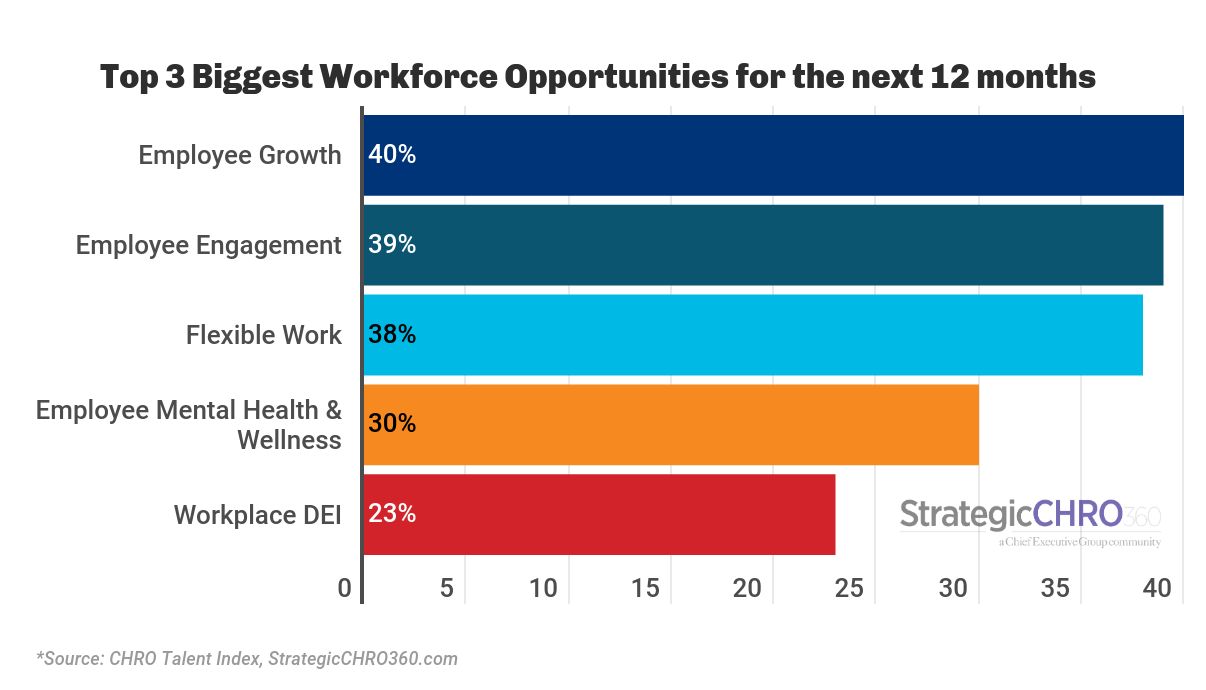StrategicCHRO360’s Q2 CHRO Talent Index, a flash poll of hundreds of CHROs and senior HR executives conducted quarterly in partnership with the Society for Human Resource Management (SHRM), shows HR chiefs are turning their focus inward in their attempt to overcome the lasting effects of the Great Resignation and ongoing talent challenges.
With soaring wages amid the threat of an economic slowdown, many organizations are now revisiting their workforce strategies to ensure they can sustain yet another spoke in the wheel. At the start of the year, 74 percent of CHROs participating in our Q1 Talent Index said they expected to increase the number of employees at their organization in 2022, with nearly 30 precent estimating that increase would be more than 10 percent. Now, only three months later, that proportion dropped 6 percent, to 70 percent.
What’s changed? Perhaps a better question would be, what hasn’t? Every member of the C-Suite polled by our sister publications has reported a similar sentiment: fatigue. Signs of exhaustion are beginning to appear, and optimism is waning. After two-plus years spent jumping hurdle after hurdle, and nevertheless thinking it would soon have to end, leadership teams are starting to come to grips with the idea that things may well get worse before they get better.
So, how can HR chiefs help support the organization through these challenging times? According to CHROs participating in our poll, the biggest workforce-related opportunity in this environment is strengthening the existing workforce.
Employee growth and development ranked first atop the list of opportunities for companies this year, followed by employee engagement. Three-quarters of the CHROs we surveyed say they plan to invest in learning and development initiatives in the coming months as a strategy to retain their top talent.
“We need to be ahead of the curve to support the people and the business,” said the CHRO of a nonprofit.
In light of the difficulties companies have finding and recruiting skilled employees—and the rising cost of wages—nurturing their current workforce may indeed be the best course of action for the time being. Data from our research shows a growing emphasis placed on employee well-being, development and career pathing, likely heightened by the increased flight of workers.
Three-quarters (77 percent) of CHROs polled in late May said their organization plans to invest more in employee mental health and wellness this year compared to last year.
“Having a wellness foundation and regular mental health support, along with a hybrid workplace, made a significant difference in our ability to pivot and move the business through the pandemic,” said the CHRO of a nonprofit participating in the survey.
Offering flexible work options also ranked high on CHROs’ list of workforce opportunities in this environment. Recent headlines over the proportion of employees willing to walk away from their employers if workplace flexibility wasn’t offered made the case for this.
And while the majority of CHROs polled say they intend to invest more in HR technologies this year than in prior years, that proportion remains low—at 53 percent. Considering the pace at which new tools and platforms emerge to continuously improve the remote or hybrid experience, HR leaders may want to stay ahead of the curve on this front as a strategy to help curb the drawbacks of a distributed workforce, from Zoom fatigue, lack of collaboration and proximity bias, to the blurring of the work-life balance, burnout and feelings of isolation.
While the Great Resignation may be a bit U.S. centric, the effect of the pandemic-induced remote workplace has had repercussions across the globe, with talent retention ranking as the biggest challenge for global organizations as well.
“Talent shortages and retention continue to be the overarching challenge,” said the CHRO of a global 5,000-plus employee company.
No surprise that when looking ahead, CHROs agree that culture, values and purpose will be the most important contributors to the success of their organization.








